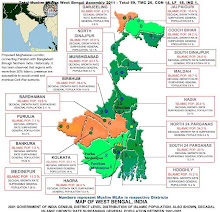Calcutta High Court concerned about the security of common people affected by the terrorist activities in West Bengal, hinted as “Safe haven for the Terrorists”.
Tanusree Pathak || Spotlight Media Centre || Kolkata, 4th Dec. 2010

The bench of Chief Justice also criticized the reluctance of the State authority for the incapacity to protect the general security for the tax payer common people against the terror threat perception gaining potency day by day in West Bengal, while giving much importance to the security for the political and other high profile personalities.
The counsel of the petitioner of a PIL (Public Interest
litigation as WP 1882w/2009, JASOBANTO RAKSHIT
Vs UNION OF INDIA & ORS.) attracted the notice of the
Court for non-implementation of NPC guidelines regarding
the set up of CCTV in every important public places
including high vigilance in the coastal area police stations
to check the terrorist elements proactive from cross border
regions, specifying this State has turned as a
“most safe haven for the subversive terrorist elements”. One Jaswant Rakshit had filed this PIL, alleging that Kolkata Police lacked modern equipment and infrastructure and the constables were recruited against bribes to senior officers and a good number of vacancies always existed in the force. It claimed that police had allowed the Kolkata city to become a haven for terrorists.
The bench of Chief Justice J N Patel had earlier directed the government to declare how many vacancies now exist in both the city police and state police. The government submitted a list showing about 30% police posts were vacant.
When the matter came up for hearing on Friday, Dec. 3rd 2010, the Chief Justice asked state Advocates General Balai Ray why the state failed to implement Justice Savarwal's recommendations. Ray said the report could not be implemented due to objections raised by senior police officials.
Ray was then asked who called the shots the state government or police officers. The court also observed that the large number of vacancies rendered police inept at doing their job.
Farook M Razzak, the additional solicitor general of the Central government, told the court that while the Centre had constituted National Police Commission and its recommendations were implemented by a few states, Bengal did not follow suit and instead set up its own police commission.
The counsel, Subroto Mukherjee for the petitioner claimed that because of the shortage of policemen, the safety and security of the common people were at stake.
Mukherjee said in the PIL that the Bengal government had not introduced NPC guidelines for modernizing the state’s police department.
“As a result, the progress of investigation in various cases is suffering badly,” counsel for the petitioner claimed. “The investigating officers cannot submit charge-sheets within the stipulated period of 90 days and criminals are getting released on bail from courts”, as Mukherjee submitted to the court.
After hearing Ray and the petitioner, the court directed the state to file an affidavit and fixed January 21, 2011 as the next date for hearing.


No comments:
Post a Comment